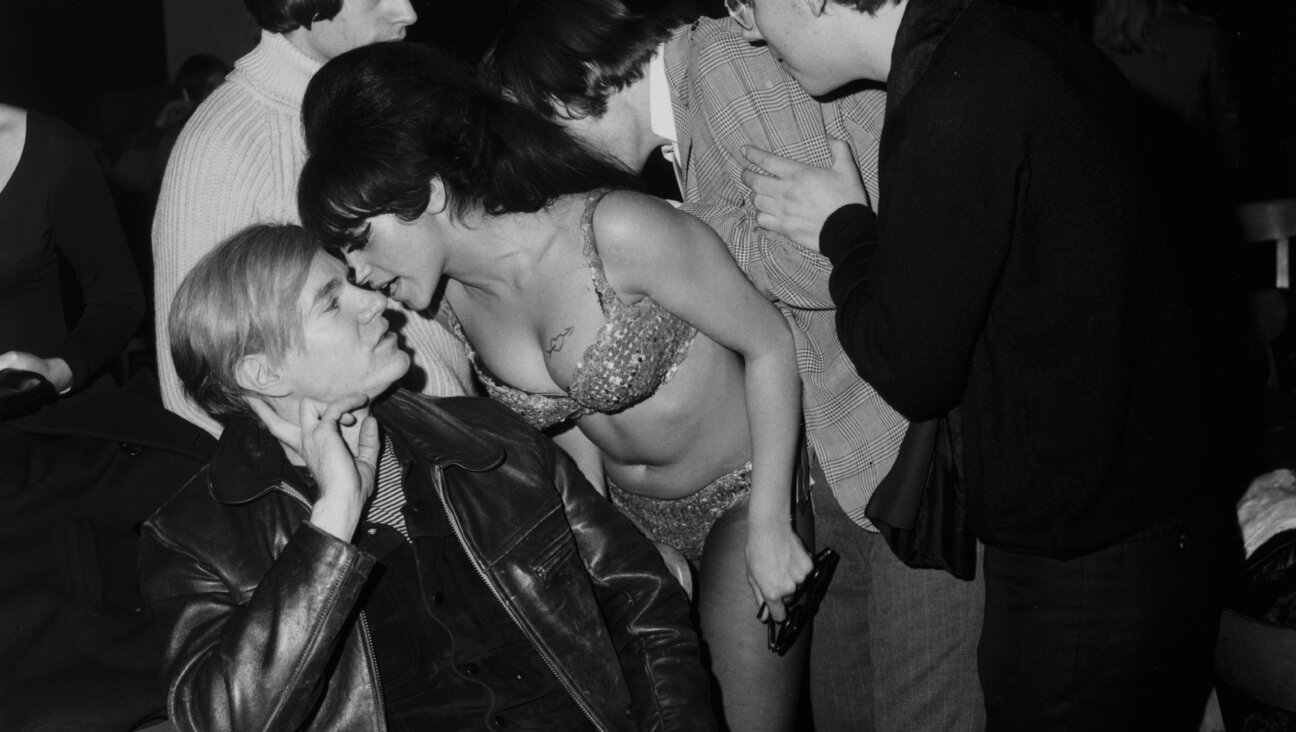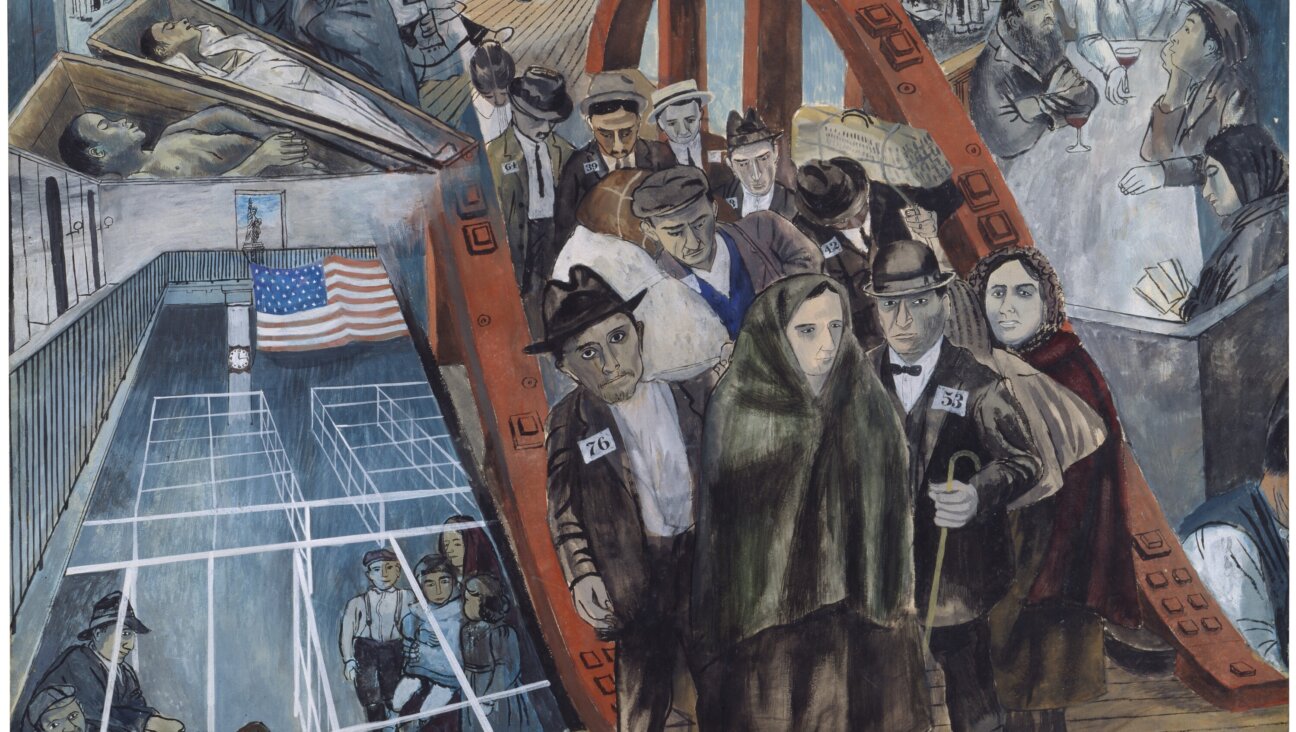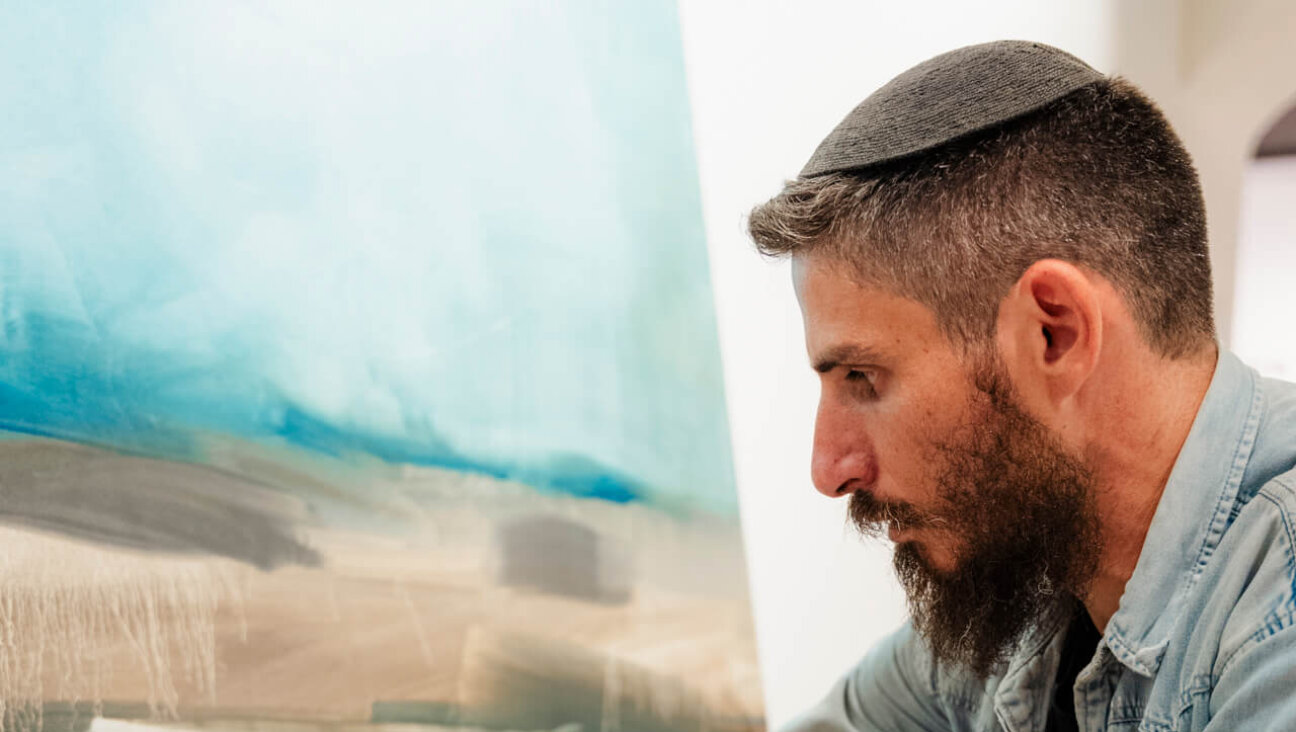These Orthodox Designers Are Making Frum Fashionable

Graphic by Angelie Zaslavsky
Chaya Chanin, 32, was telling me about the genesis of The Frock, NYC, her online business featuring styles designed for the seriously Orthodox woman who wants to be more fashion-forward. At the same time, her 30-year-old sister and company co-owner, Simi Polonsky, was busying herself taking pictures of us, clicking away on her cell phone, moving this way and that, always seeking the best possible angles for yet another posting on Instagram.
In Polonsky’s apartment in Brooklyn’s Crown Heights, which also serves as The Frock’s headquarters, the two Australian-born daughters of a Chabad rabbi juggle their home lives with a 7-year-old business that is, by their own description, an amalgam of Down Under surf culture and Orthodox modesty.
“We were exposed to women in bikinis very early on, and we saw the pictures in Vogue magazine,” Chanin recalled. “We were aware of ourselves as different, and wanted to blend in, mostly so that people wouldn’t look at us and make a whole set of assumptions based on what we looked like.”
You would probably not guess they were Orthodox at all. For starters, you would never know that their free-flowing hair styles were sheitels.
Chanin was clad in dungarees, admittedly under a boxy dress, and Polonsky sported leggings with cutout knee holes, though she, too, had donned a tunic. These gals would not be out of place strolling along Madison Avenue.

Image by Courtesy of The Frock
The sisters don’t point to themselves as Orthodox Jews, but they are not trying to assimilate, nor do they advocate it for anyone else. On the contrary, they want to broaden the Orthodox community or at least not lose those practitioners who are turned off by the fashion restrictions.
Their hottest item at the moment is “the slip,” or, more precisely, a modified version of the clinging sleeveless dress evoking lingerie and often worn by celebrities strutting up and down the red carpet at awards ceremonies. The sisters’ slip is neither revealing nor body hugging, and they promote it with appropriate tops that are concealing yet represent the most modish layered look.
•
The Frock, NYC is part of a burgeoning movement of Orthodox momtrepreneurs — retailers and designers — who are popping up in response to a growing demand for more fashion choices by creating items that are at once modest and cool.
Elbows and collarbones need to be covered, and hems should ideally land 3 to 5 inches below the knee. Tight-fitting or sheer materials are out. Bright colors — especially red — are seen as immodest, though some Orthodox women do sport those colors (especially on accessories).
There are many reasons for this new demand for fashionable styles. A growing number of highly educated Orthodox women are working outside the home in nontraditional fields — they are not necessarily yeshiva teachers anymore. And the internet has created a ready platform for an online business that doesn’t need a middleman for promotion and advertising. It costs relatively little to launch.
•
Family-run businesses are common in Orthodox fashion. Mimi Hecht, 30, and her sister-in-law Mushky Notik, 28, founded their online fashion company, Mimu Maxi, five years ago, and they say it now generates $1 million a year.
Seated at a long table in their Crown Heights storefront studio basement, flanked by racks of clothes and merchandise-filled boxes ready to be shipped, they say their business was spawned by their collective dissatisfaction with the limited offerings available to them.
They wound up sketching their own designs, hired a pattern maker to create the garments, and, with $1,000 in seed money, inaugurated a homegrown online business. Their signature design is the square-shaped oversized shift — including chic cascading smocks and sack dresses. A top-selling item is “skirt leggings,” though strictly speaking they are not leggings at all, but rather comfortable, loose-fitting and attractive skirts that feel like leggings.
“The initial response in our community was, ‘What is this?’” Hecht recalled. “Some felt our clothes were not ladylike. You have to realize that in the Orthodox community, clothes are generally tailored.”

Image by Courtesy of Mimu Maxi
Thanks in part to their constant presence on social media — with more than 30,000 followers — they have reached a community well beyond the Orthodox, and they derive special pleasure from the inroads they’ve established among their non-Jewish counterparts.
Hecht and Notik believe that modesty is now “in” — that it’s the new feminism — and may partially account for why outsiders are drawn to their fashion line. “It takes a certain confidence to be modest,” Hecht said.
“I don’t have to display my body,” Notik added. “I protect my body because I’m so powerful.”
Still, they admit that modesty comes at a cost. Many secular people may feel threatened by it, as it violates cultural expectation. And when they spot a Hasidic or, more usually, a Muslim woman in traditional outfit, they see it as an expression of subjugation.
“The idea that we all dress modestly so that men won’t look at us [is] so negative,” said Hecht. “We believe in the power of sexuality, but it is with one person, and that’s where we express ourselves that way. We don’t believe showing cleavage and wearing tight-knit clothes is a self-respecting way to express sexuality.”
“Mimi and Mushky have warmth, hospitality, and they’re on the forefront of modest fashion for Jewish and Muslim women who are pushing the boundaries,” said Layla Shaikley, a catalyst and influence behind the “Mipsterz” movement, a subculture of Muslim Americans who identify with art and culture as well as with their own faith. “It was very hard for me — and girls like me — to find clothes, but that’s changing because of Mimi and Mushky in addition to many Muslim designers.”

Image by Courtesy of Mimu Maxi
Still, she points out, the fashion restraints facing Jewish and Muslim women are not the same. It’s far more complex for the Muslim woman, who is often viewed with fear from the outside world if she is traditionally clad, and with contempt from her own world if she’s not. Any fashion decision a Muslim woman makes carries a political dimension that does not exist to the same degree for Hasidic women. Shaikely nevertheless feels a special sisterhood with her Hasidic counterparts.
So does secular fashion blogger Nicolette Mason. She first became aware of Hecht and Notik when they posted a photo on Instagram of a Muslim fashion blogger who was wearing one of their outfits, thus sparking some heated debate among their Hasidic followers, many of whom felt that a picture of a Muslim did not belong. Hecht responded by saying that Muslim women shared many of their same values.
“I was so impressed — moved to tears — by the fact that they did not give in to social pressures,” Mason recalled. “It was a remarkable show of integrity when they refused to delete the post. I wrote to Mimi to thank her.”
•
June Aboksis, 49, is a veteran retailer within the Orthodox community. In business for 12 years, she owns and runs seven stores — all dubbed Junee — located throughout Brooklyn; Lakewood, New Jersey, and Lawrence, New York. A new three-storied and glass-walled department store is in the works, slated to open shortly on the outskirts of Brooklyn’s Boro Park.
“Our customers can be anywhere between ages 11 and 80,” Aboksis said. “They may be Christians, blacks and Jews of all denominations, from Modern Orthodox to Satmar. We try to keep the fashions modest, but also cool, fashion-forward and affordable.”
Aboksis says she believes that modesty has become hip, citing the Middle Eastern influence in shaping the layered look that’s popular among the Orthodox.
In her warehouse based in Brooklyn’s Flatbush — with the train roaring above — the walls are lined with racks of dresses, skirts and tops. Pantyhose in an array of colors are also on display. Aboksis oversees a handful of designers and merchandisers (she employs more than 40 staffers in her stores).
“Shopping patterns have changed among the very Orthodox,” she said. “Years ago, women shopped twice a year, the spring and the fall. Retailers had good months and slower months. That’s not true anymore. We’re shipping throughout the four seasons. There’s constant demand, and we have to fill it immediately. It can’t wait.”
Peer pressure, she continued, has always existed, but now it’s more intense than ever, thus upping the ante even further for the retailer. Not too long ago, girls had one Shabbat dress; now they have four or five, with a greater demand for variety.
Yet within her community, some critics have voiced displeasure with the fashion shifts, and they serve as local store watchdogs, advocating boycotts if, in their view, it’s necessary, but more usually holding meetings with store owners to remind them that if they want their continued patronage they will have to accommodate them with more traditional clothes and fewer (if any) trendy fashion choices.
One such group, Kol Kevuda, provides teenagers with cautionary magazines, questionnaires and handouts on how to shop; its spokespeople give lectures to girls and their mothers, and a recorded 17-minute message — available on a special phone line — has been put in place for yeshiva school principals, urging them to teach students how to be vigilant when they go shopping, suggesting they arrive with rulers in hand to make sure that hem lengths are suitable, and advising them to complain if that’s not the case.
Aboksis says it’s a balancing act for her, and while she provides customers with contemporary choices, she often veers on the side of sartorial caution, thanks to her own aesthetic and religious views — even if this costs her the loss of shoppers who reflect more flamboyant tastes.
•
The women behind Undercover Waterwear, Ladies & Girls Modest Swimwear Collection say their religious beliefs also inform the way they do business. This is most pointedly the case with unethical competitors, some of whom, they say, have plagiarized their designs.
“It has happened and it makes me very angry, especially when I knew the person who did it and she had promised me she wouldn’t,” said Melissa Chehebar, 45, who, along with her sister, Rachel Tabbouche, 34, and her mother, Susan Esses, runs the swimwear company. “But in the end I let it go, because I realize whatever I do or don’t do is not going to make too much of a difference anyway. God has his plan.”
This 10-year-old business points to a radical evolution among ultra-Orthodox women who want to go to the beach, be physically active, feel comfortable and look chic even if men (to whom they are neither married nor related) are present. To this day, many ultra-Orthodox women do not go to the beach at all — even if they’re gender segregated. And if they do, they don’t go in the water.
Those who do venture into the water typically wear long, loose-fitting T-shirts over mid-calf-length skirts, or sport baggy dresses with full- or three-quarter-length sleeves, high necklines and below-the-knee hemlines. The operative description is frumpy and uncomfortable.
Chehebar created her own beach covering — a simple black dress made of bathing suit material, a Lycra spandex — and discovered, to her surprise, how many women friends loved it and suggested she go into business. In short order, she, her mother and sister had set up a wholesale operation.
“With samples we went from store to store, mostly small Jewish stores in Brooklyn, to get orders,” Tabbouche recalled. “In the beginning we found the Sephardic Jews more open to what we were selling; the Ashkenazi Jews didn’t get it at first. We also ended up in an Upper West Side boutique that sells lingerie and activewear to many secular women. The owner was hesitant, but ultimately agreed. As it turned out, the customers liked what they saw, and we still sell to him.”
Tabbouche and Chehebar also believe modesty is gaining a cachet in the culture at large just as physical activity is increasingly enjoyed by Orthodox women who now realize they need more accommodating clothes for those sports that at one time would have been virtually unheard of.
“Without detracting from our religious beliefs, we are very much part of the society at large,” Tabbouche said.
The sisters now operate out of their mother’s basement on Ocean Parkway in a Jewish Syrian enclave. They walked me around the space, with its rows of colorful mix-and-match tops and skirts, along with one-piece beach dresses of varying sleeve and hem lengths, some solid-colored and others patterned.
Their latest creation designed for women who bike and hike — as well as those who may wish to wear it poolside or elsewhere — is below-the-knee skirts with mid-calf- or ankle-length leggings attached.
Their business is run online for the most part, though they also sell to individuals who make appointments to come to their space, including a 90-plus-year-old woman who wants to be personally served and fitted for beachwear before her annual trip to Florida.
The sisters are especially gratified that their line appeals to women across ethnic and religious lines, who are concerned about modesty, comfort and affordability.
Carol Blake, a General Baptist in Greenville, Kentucky, faces no religious guidelines regarding appropriate swimwear, but she says that, as the wife of a preacher, she needs to distinguish herself from the rest of the flock, and until recently she wore a plain-old dress when she went swimming. Aside from discomfort, the dress floated up or clung to her body, thereby defeating its purpose. She was looking for an alternative, but Blake admits that she was reluctant when a friend told her about Undercover Waterwear.
“Every time I bought clothes online I’d have to return them,” she said. “But since it was a 30% discount I thought I would take a chance. As it turned out, everyone was so nice and helpful, and the dark-blue swim dress with three-quarter sleeves, a high neck and a pair of shorts under the dress was perfect. It doesn’t float up or cling. And it dries quickly. I would definitely buy from them again.”
Simi Horwitz is the author most recently of ‘Jewish Art Today: News, Views and Cultural Trends’ (Hadassa Word Press), a collection of articles originally published in the Forward. She recently won two National Arts and Journalism awards, including one for her Forward feature ‘The Jews of Al-Jazeera.’























